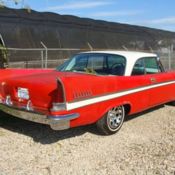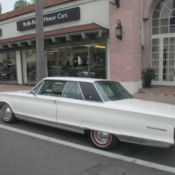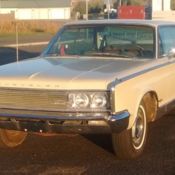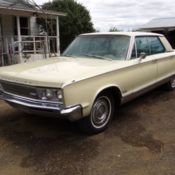1966 CHRYSLER NEW YORKER 440 CALIFORNIA NUMBERS MATCHING CAR
| Make: | Chrysler |
| Model: | New Yorker |
| Type: | Sedan |
| Year: | 1966 |
| Mileage: | 83,139 |
| VIN: | CH43J63115523 |
| Color: | Blue |
| Engine: | V8 440 |
| Cylinders: | 8 |
| Fuel: | Gasoline |
| Transmission: | Automatic |
| Drive type: | RWD |
| Interior color: | White |
| Vehicle Title: | Clear |
| Item location: | San Diego, California, United States |
| Extras |
|
Air Conditioning, Power Windows |
| Listed by | Private seller |
Description of 1966 Chrysler New Yorker |
|
1966ChryslerNew Yorker Original California numbers matching 4 door hardtop sedan. Car runs great smooth at 90 mph NO RUST on body ever always garaged had 1 repaint that is fair interior is original and in decent condition. Motor is solid runs strong radiator is good car fires right up, transmissionworks goodthroughout all gears but reverse seems to get lost when trying to shift, notsure what it is? Car shows nice only issues are shown in photos please see pictures straight body! Priced car at a very fair price for its condition taking into consideration the lil stuff. Please call or email for a full walk around description of car thank you, Almost forgot we foundOriginalowners warranty card info still attached to radiator support with all cars original info still intact! History of the 1965-1968 Chrysler New Yorker Since 1960, Chrysler had dug itself out of a hole and in order to stay competitive in the upper-middle-class full-sized market, badly needed a home run for 1965. All major competitors were going to be all new for ‘65. A rehash of the trim 1963s just was not an option. “Trim” and “nimble” were out, and big cars were in. 1965 was also expected to be the same sort of banner year for auto sales that 1955 had been. It was a prediction which came true. With a wheelbase stretched to 124 inches from 122, the new cars would be competitive, but it was the growth in overall length to 218 inches from 215 as well as the new styling by Elwood Engle’s highly talented design team that made the car look right and made it competitive. What really set apart the new Chryslers, though, would not become apparent for a decade, after the car had often passed to its second or third owner. The unit body cars’ sills and inner fenders were built of galvanized steel. In an era when new cars rusted entirely out within five to 10 years in northern and mountain states, these cars often lasted 30 to 40 years as daily drivers. Massive all-new Budd power assisted front disc brakes were a new option shared with Dodge and Plymouth for 1965, and which were competitive with Ford’s new front disc brakes also introduced a full two years ahead of GM’s full-sized cars. Another trendsetting invisible upgrade was the constant-velocity joint in the driveshaft which reduced potential drivetrain vibration. Indeed, these were the best Chryslers of the decade and probably the best cars the company built for the next three or four decades. The buyers somehow knew it, with New Yorker sales increased from about 30,000 in 1964 to nearly 50,000 in 1965, nearly that number in 1966, nearly 40,000 in 1967, and nearly 50,000 in 1968. These cars are simply massive inside, with room for six corn-fed adult Americans and then some, with a trunk sufficient for luggage for that many to take a long trip. The ride is the equal of competitors of its day, and the handling is superior, given the combination of torsion bars in front and semi-eliptic leafs at the rear. Power was supplied from 1966 by Chrysler’s improved new big-block 440 cubic inch V-8 engine (up from 413). These engines used premium fuel, belting out a more than competitive 360 hp in its sophomore offering, and an even more important 470 lb-ft of torque, for sublime acceleration at any time under any conditions. This V-8 was backed up with the rightly famous Torqueflite 727 automatic, noted then and now as one of the best automatics ever built. Chrysler’s own power steering was less successful, lacking road feel, while Chrysler’s own Airtemp air conditioning was terrific but let down a bit by an odd vee-twin compressor that was noisier than GM’s swashplate jobs. Luxuries abounded in the cars, with many cars ordered with power windows, power door locks, cruise control, power seats, AM/FM stereo, air conditioning and leather interior. Power steering, power brakes and automatic were standard equipment. During the time this generation of cars was built, each model year saw the normal changes to differentiate model years with the typical new grilles, revised trim, changed instrument panels, upholstery, trim and taillights. The basic cars were handsome and top-shelf, and savvy potential buyers who dared to try non-GM brands were often surprised to find that Chrysler had come back with a vengeance. Other typical buyers included habitual Chrysler owners who already knew of the advantages often seen in big Mopars. 1966 Chrysler New Yorker Info
|
 Home
Home Contact us
Contact us NEWEST CARS
NEWEST CARS SELL YOUR CAR
SELL YOUR CAR FAQ
FAQ


















